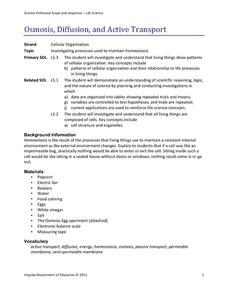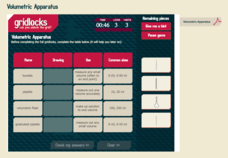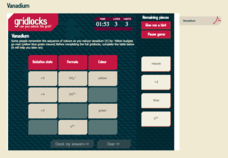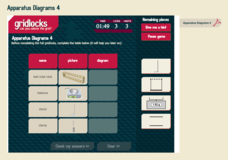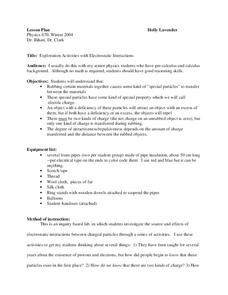Royal Society of Chemistry
pH 2: Activity
Pupils puzzled over pH? Incorporate an interactive resource that teaches through games! Chemistry scholars use reasoning to solve puzzles that focus on determining the pH based upon hydrogen ion concentration.
Virginia Department of Education
Osmosis, Diffusion, and Active Transport
No, it really is okay to play with your food! Emerging scientists manipulate popcorn, eggs, and other household objects as they demonstrate multiple cellular processes. The activity, capable of modifications, is designed to reflect...
Royal Society of Chemistry
Shapes of Molecules—Geometry of Central Atom
How is a molecule's shape determined? Explore bond angles, lone pairs, and VSEPR theory through a logic-based activity. Chemists pull together information about the major molecular shapes, then use it to solve puzzles.
Curated OER
Is it alive?
Kids in grades K-2 increase their logical reasoning and visual discrimination skills by determining which things shown are alive. They use the criteria that all living things move on their own to mark each image as alive or not.
Royal Society of Chemistry
Extraction of Copper
Is copper found as a raw material? Science sleuths manipulate the reactants and products found in the copper extraction process in a series of fun puzzles. The interactive engages learners in pairing formulas with their names while using...
Royal Society of Chemistry
Symbols
Chemistry calculations can look a bit like alphabet soup at times. How do you help pupils make sense of it all? An interactive resource helps scholars sort through the symbols for common quantities such as moles, boiling point, and...
Royal Society of Chemistry
Volumetric Apparatus
Can your class tell the difference between a burette and a pipette? Develop their lab apparatus knowledge using a series of puzzles. The online activity associates the name, image, and sizes of burettes, pipettes, volumetric flasks, and...
Royal Society of Chemistry
Shapes of Molecules—Hybrid Orbitals
Take your chemistry class' knowledge of molecular geometry to the next level! Introduce orbital hybridization with a series of related games. Individuals complete a data table in the first activity, then solve Sudoku-like puzzles using...
Royal Society of Chemistry
Shapes of Molecules—Distortion from the Pure Geometry
Ready to introduce the realities of molecular geometry to chemistry pupils? Use a logic-based interactive! Perfect as individual practice, the puzzles explore the bond angles and repulsions present in three common molecular shapes.
Royal Society of Chemistry
Vanadium
Introduce your chemistry scholars to the periodic table's Goddess of Beauty! Through an interactive that highlights the transition metal vanadium, learners discover the colors produced in solution as vanadium changes oxidation state....
Royal Society of Chemistry
Apparatus Diagrams 1
One of the biggest challenges for beginning scientists is figuring out the names of the equipment! Introduce your chemistry class to essential lab apparatuses using a series of related games. Pupils pair images of a test tube, funnel,...
Royal Society of Chemistry
Apparatus Diagrams 4
Lab tools are cool! But, which one is the right tool for the job? Young scientists participate in a series of puzzles focused around some common lab equipment. Each puzzle requires learners to associate the tool with its image and a...
Royal Society of Chemistry
Alkalis and Salts
Gamification is an educational sensation! Young scientists build their acid-base vocabulary skills through a series of puzzles focused on bases and the salts they form. The challenging activity comes complete with a printable version and...
Royal Society of Chemistry
pH 4: Activity
Sometimes playing games in class isn't a bad thing. Science sleuths evaluate and calculate pH and pOH with an online resource. They then manipulate concentration information and relate it during a series of puzzles.
Curated OER
Arctica - An Interactive Mystery
Rumours of illness, poisoning, and madness - a ship disappears without a trace! Read this interactive science story and use deductive reasoning skills to solve a mystery. This engaging resource gives science stars a chance to practice...
New York State Education Department
TASC Transition Curriculum: Workshop 11
You'll C-E-R a difference in classroom achievement after using a helpful lesson plan. Designed for economics, civics, government, and US history classes, participants practice using the CER model to craft arguments about primary and...
Ohio State University
Exploration Activities with Electrostatic Interactions
Step out of the 21st century and discover protons and electrons through observation. Using common materials, participants continually adjust their explanation of charges. The final assessment requires pupils to design their own...
Royal Society of Chemistry
Apparatus Diagrams 2
Ready to heat things up in the lab, but your class doesn't know its way around a Bunsen burner? Scholars get familiar with heating apparatuses through a series of puzzles designed to promote vocabulary and reasoning skills. The...
Royal Society of Chemistry
Halide Ion Tests
Young chemists love it when colorful solid products appear in a reaction vessel! Scholars discover the products that form during halide ion tests through a hands-on activity. Users go online and apply chemistry knowledge and reasoning...
Royal Society of Chemistry
Acids and Alkalis
Is your acid-base chemistry lesson plan a little ho-hum? Spice things up with puzzles! Young chemists manipulate facts about acids and bases to solve a series of interactive puzzles. The activity combines content knowledge and...
Royal Society of Chemistry
Organic Formulae 2
Is your chemistry class frustrated by the multitude of representations of organic molecules? Add some challenging puzzles to an otherwise ho-hum organic lesson and let the fun begin! The second of a two-part activity focused on basic...
Virginia Department of Education
Work and Power
Assist your class with correctly calculating the values for force, work, and power as they determine the amount various activities require. They gather data and participate in a group discussion to compare results upon conclusion of the...
Curated OER
Improving Deductive Reasoning Skills
Students develop a strategy list for problem solving by working with different types of problems. They recognize problems that may be solved using deductive reasoning and solve deductive reasoning problems.
Intel
Forensics: Get a Clue
Although the methods are all scientific, forensic science was started by police officers rather than scientists, who relied on observation and common sense. Young detectives use many tools to solve crimes around the school in a...

